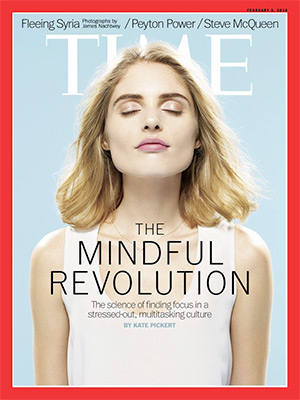Everywhere I go these days, I hear about mindfulness. Mind you, I do spend a lot of time around people who like to think about their thoughts and mental processes (“metacognition”) and expand awareness in their lives! But whether it’s magazine covers, social media posts, and even in my sessions with patients, people are talking about mindfulness and meditation (which is basically the practice of mindfulness). TIME magazine even released a special edition on mindfulness recently.
 I have come to realize that being mindful is stylish. And as a mental health professional, I think that is absolutely fantastic.
I have come to realize that being mindful is stylish. And as a mental health professional, I think that is absolutely fantastic.
I recently attended a training in integrating mindfulness into my counselling practice, and I want to share some information with you about what this is about.
So, what is mindfulness?
The concept of mindfulness has been around for a very long time and has often been associated with meditations practiced by Buddhists. However, the concept of mindfulness has been adapted into secular treatment by psychologists and psychiatrists for almost 50 years, now. Recently, mindfulness and mindful meditation have garnered a lot of attention in pop culture. This means more and more people are choosing to research the benefits of mindfulness, which allows us to know more about it and why it can be useful to us.
At the most basic level, mindfulness is bringing attention and awareness to what is happening here and now. It sounds simple and, in theory, perhaps it is. However, as humans with brains that like to wander–and especially humans in the 21st century with so many distractions–it takes energy, intention, and time to master the practice of mindfulness.
Why would I want to be mindful?
With everything going on in our lives, being mindful might feel like just one more thing I “should” do. However, the benefit of being mindful is that it can help manage the stresses and strains of a busy life.
If we can be more present, it allows us to focus more fully on the task at hand. This might help with attending to your relationship with your loved ones, increasing your connection with the enjoyment of doing a pleasurable activity, recognizing stiff muscles in your body which you can then relax, and help you identify why you might be stressed so that you may choose an appropriate way to manage it. There is also growing evidence that mindfulness can be helpful for people experiencing anxiety, depression, and chronic pain.
How do I become mindful?
There are many different avenues people take to become more mindful. There are a variety of mindful tasks that allow you to practice increased awareness during things you do every day automatically or without thinking about it (e.g. the classic one is to pay attention while washing dishes or really tune into your senses while eating). There are also more formal practices people might commit to such as meditation classes or individual meditations. Every person is different and how one learns and practices mindfulness can be a process of determining what fits best with you and your life.
What if I feel like I cannot be mindful?
The good news is that you do not have to be perfect–and no one is (well, perhaps the Dalai Lama is close, but I bet he practices A LOT). Some days, being mindful may be easier than others. And even being aware that it is difficult to be mindful means you are being mindful!
Learning how to be mindful means developing a new skill–which means it will be tough in the beginning. Imagine you’re learning to ride a bike (again). At first, things feel shaky, you’re working new muscle groups, you’ve figured out the rhythm of peddling, and after the first time, you may still feel like you have not mastered it. However, the more you practice, the better you get. And just like riding a bike, there may be days when mindfulness is more difficult depending on what is going on. However, consistency is key, and the more we intentionally practice mindfulness, the easier and more automatic it becomes.
If you are interested in reputable sources of information on mindfulness, I would recommend checking out www.mindful.org for information on this topic that is accessible and helpful!
